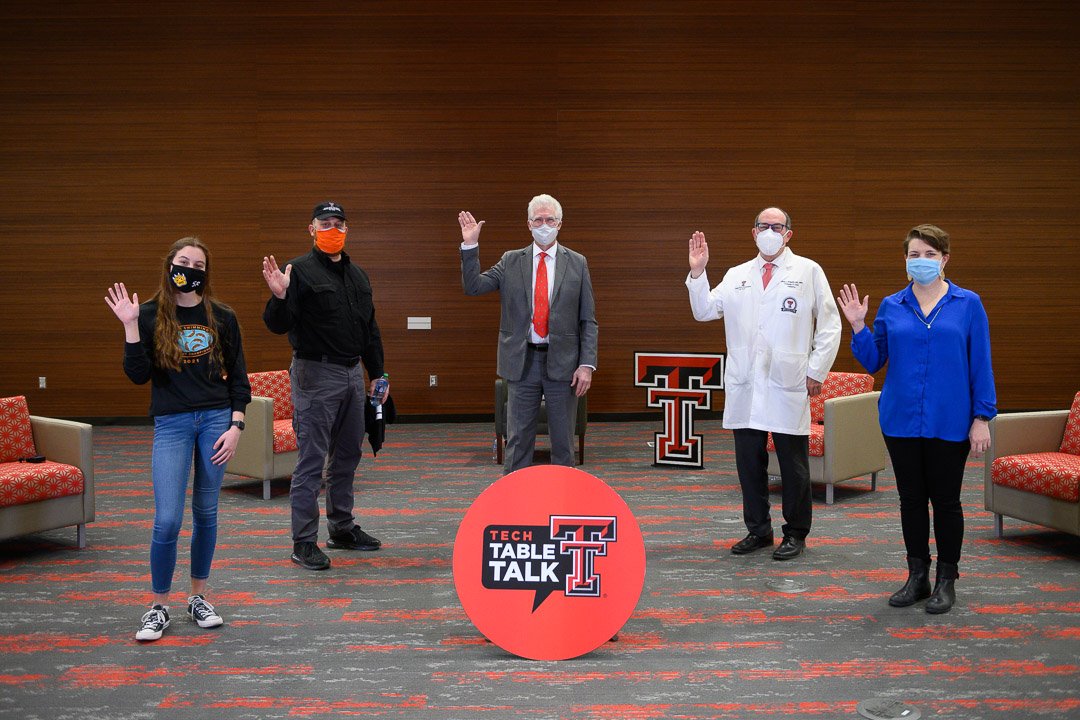Tech Table Talk
Tech Table Talk: Teacher and Student Join Physicians for Discussion on Returning to Classrooms
Classrooms can be safe for students and teachers if Centers for Disease Control and Prevention guidelines are followed, and a return to campus may be best for students’ mental well-being this school year.
That was the takeaway from Tech Table Talk, a Facebook Live panel discussion hosted by Texas Tech University Health Sciences Center El Paso on Monday, Feb. 22. Tech Table Talk is a series that brings together Texas Tech Physicians of El Paso experts and community members for discussions of important health topics. A recording of the discussion is available for viewing on TTUHSC El Paso’s Facebook page.
Monday’s broadcast featured Michael Reese, an El Paso High School human geography and U.S. history teacher, and his daughter Sofia Reese, ninth-grade student at El Paso High School. They shared their concerns and feelings about returning to the classroom amid the COVID-19 pandemic and heard some tips from Glenn Fennelly, M.D., M.P.H., chair of pediatrics for TTP El Paso, and Sarah Martin, M.D., Child and Adolescent Psychiatry Division Chief at TTP El Paso.
“I would tell my fellow students, based on what the experts say, it is safe to return to the classroom and get back to a new normal,” Sofia Reese said at the end of the talk. “If you trust the medical community, then you should know it’s safe for your children to go back and get that human interaction that they miss and need right now.”
Dr. Fennelly shared information on vaccines, the risks of spreading virus in the classroom and what needs to be done to avoid getting sick. He answered the first viewer question of the night: “Is it safe for children to return without the vaccine?”
“We know what measures to take to get children, staff and teachers back to school safely,” Dr. Fennelly said. “The CDC has updated criteria, and it’s a lot of what we already know: masking, social distancing, personal hygiene (washing your hands), keeping the environment clean and identifying children who are exposed and possibly asymptomatic. If we follow those five steps along with quarantining and testing, you can greatly reduce the risk in the school.”
Dr. Martin spoke about mental wellness issues that children may be undergoing due to being primarily at home, on the computer too much or just missing human interaction. She highlighted the benefits of returning to the classroom.
“Part of the mind developing and growing has to do with social interaction,” Dr. Martin said. “It’s been hardest for the children who are least prepared for social interaction. Parents of children with autism are the ones who are reaching out to me the most. They are saying that their children are having a hard time during the pandemic.”
Not every student is the same. Some may enjoy staying home, while others may be getting anxious. Dr. Martin provided warning signs that being isolated may be hurting a child’s mental state.
“The No. 1 thing to look for in your own child is if their irritability has increased, while some children may just stop doing the things they used to enjoy,” Dr. Martin said. “Everybody has a bad day, but if you’re looking at weeks where the child is very irritable, fighting with everybody and not wanting to do their favorite things anymore, those are some serious signs.”
Ultimately, parents will have to be the ones to make the decision to return. Both physicians encourage parents to look at all the facts about classroom learning and the virus to make an informed decision.
Michael Reese assured parents that educators have their students’ best interests in mind and will do everything they can to keep their children safe.
“We made a promise to you, from the administration to the faculty to the entire school staff, to take it seriously, take your child’s health seriously and to follow guidelines to prevent the virus from spreading,” Michael Reese said. “Trust the experts, not a Facebook meme or conspiracy theories.”
One factor that will make a difference for everyone in the classroom is the vaccine. Michael Reese said most teachers he knows are eager to get the vaccine, and Dr. Fennelly added that parents should not fear the vaccine when it’s time for children to receive it.
“In recent surveys, one in three parents say they will not vaccinate their children when the time comes. That decision is being made based on fear not fact,” Dr. Fennelly said. “It will not be approved and used in children until it’s proven to be safe. Follow the evidence, get informed and don’t look at the misinformation about the vaccination.”
This was the third Tech Table Talk hosted by TTUHSC El Paso on Facebook. The Tech Table Talk series was launched so residents from the Paso del Norte and West Texas region could hear directly from front-line professionals during the COVID-19 pandemic. The goal is to bring critical conversations to the table to improve the health of our community and dispel misinformation that’s been spreading on social media, Dr. Lange said.
“This sort of forum is a necessary and essential antidote to misinformation or even just a lack of information in the community,” Michael Reese said following the event. “We all have our lanes of professional responsibility, and this discussion was a partnership of all involved in returning the classroom.”
The discussion was moderated by Richard Lange, M.D., M.B.A., president of Texas Tech University Health Sciences Center El Paso. Viewers were encouraged to submit questions to the panel during the event.

